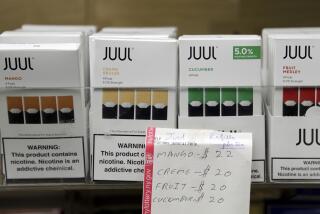Tobacco Payments to States in Doubt
- Share via
Tobacco giant Philip Morris USA has said it might miss an upcoming payment of $2.6 billion under its legal settlement with 46 states if it isn’t relieved of a giant appeal bond in an Illinois class-action case.
The default warning came in a letter from Philip Morris released Friday by Washington Atty. Gen. Christine O. Gregoire, who said attorneys general plan to intervene next week on behalf of cash-strapped states if the appeal bond dispute isn’t resolved.
Gregoire’s announcement was among a flurry of events Friday as fallout intensified from Philip Morris’ huge loss last week in the class-action case.
On March 21, Madison County Circuit Judge Nicholas G. Byron ruled that Philip Morris had deceived Illinois smokers of low-tar brands into thinking the brands were safer, and ordered the company to pay $10.1 billion in compensatory and punitive damages.
Byron also ordered the company to post a bond of $12 billion to guarantee payment of the judgment plus interest if the appeal fails. It is believed to be the largest appeal bond ever required by a U.S. court.
Lead plaintiffs’ lawyer Stephen Tillery on Friday called the company’s crisis “a hoax.” Philip Morris is trying to “scare the dickens out of the attorneys general” so they will apply pressure to reduce the bond, he said.
Philip Morris faces a deadline of April 15 to make its annual payment under the $206-billion settlement reached in 1998 by the tobacco industry and 46 states. Four other states reached separate settlements totaling $40 billion.
California, whose share of the payments is nearly 13%, is to receive $331 million of the $2.6 billion owed by Philip Morris, said Dennis Eckhart, a senior assistant attorney general. Half of the $331 million is earmarked for the state treasury, with the remaining to be distributed among California’s counties and the cities of Los Angeles, San Francisco, San Diego and San Jose.
A default could cost the state in two ways, by eliminating this year’s payment and making it more costly to sell tobacco bonds tied to future settlement payments. The state is counting on the bond sales to cut the budget shortfall by $4.5 billion.
Gregoire, a lead negotiator of the 1998 settlement, said Friday that without a reduction in the appeal bond in the next few days, attorneys general would go before Byron to discuss the default risk.
Altria Group Inc., parent of Philip Morris, said Friday in a filing with the Securities and Exchange Commission that “it is not possible for Philip Morris USA to post” a $12-billion bond. Without relief from the Illinois legislature or courts, the company “would not be able to stay enforcement of the judgment” during the appeal. The company said it would “take all appropriate steps” to protect itself, but it did not give specifics.
Also on Friday, credit rating firm Standard & Poor’s said Philip Morris “might have to consider bankruptcy” unless the bond is lowered. S&P; said it might lower Altria’s ratings to “junk” status if the bond requirement remains in force.
Altria stock tumbled Friday by $1.17 to $32.13 on the New York Stock Exchange.
A bill before the Illinois legislature would cap appeal bonds at $25 million, but its prospects are uncertain.
Martin Feldman, tobacco analyst with Merrill Lynch, said that if the company doesn’t get help from the legislature or the courts, it might be forced to pay a large, nonrefundable sum to the plaintiffs to persuade them to reduce the bond.
On Friday, Tillery, the lead plaintiffs’ lawyer, said company documents filed under seal in the case “clearly demonstrate that they would have no trouble paying the judgment, let alone bonding it.... They are just yanking everybody’s chain.”
Tillery called on Philip Morris to release the financial records. In its letter to Gregoire, the company offered to open the books to attorneys general on a confidential basis. But a spokesman said the company would not make them public at this time.
Matt Myers, president of the Campaign for Tobacco-Free Kids, said that despite the claim of financial stress, “there is no indication that the company is curtailing its multibillion-dollar” promotional spending.
*
Times wire services were used in compiling this report.
More to Read
Inside the business of entertainment
The Wide Shot brings you news, analysis and insights on everything from streaming wars to production — and what it all means for the future.
You may occasionally receive promotional content from the Los Angeles Times.









